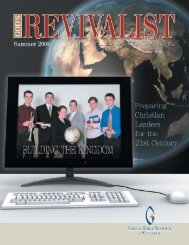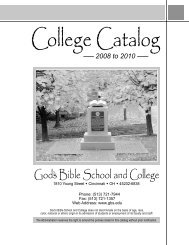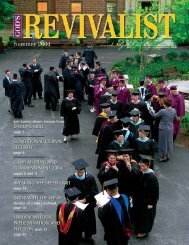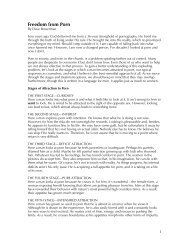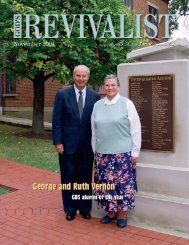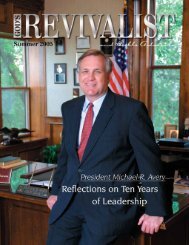Download the October Issue - God's Bible School & College
Download the October Issue - God's Bible School & College
Download the October Issue - God's Bible School & College
You also want an ePaper? Increase the reach of your titles
YUMPU automatically turns print PDFs into web optimized ePapers that Google loves.
<strong>the</strong><br />
president’s<br />
page<br />
HALF-WAY CHRISTIANS<br />
by Michael R. Avery, President<br />
In <strong>the</strong> early 1600’s <strong>the</strong> Puritans made <strong>the</strong> arduous journey<br />
to America to establish a pure community of likeminded<br />
Christians, a “City on a Hill.” As <strong>the</strong> first generation<br />
of <strong>the</strong>se settlers began to die off, <strong>the</strong>ir congregational<br />
churches faced a membership crisis. Full participation, or<br />
membership, had been limited to <strong>the</strong> “Visible Saints” —<br />
those who had made a public affirmation of a conversion<br />
experience. In <strong>the</strong> early days, most Puritans testified to<br />
such an experience. But as time passed, <strong>the</strong> fires of conviction<br />
did not burn as brightly in <strong>the</strong> hearts of <strong>the</strong> secondand<br />
third-generation Puritans. Fewer of <strong>the</strong>m had a “conversion<br />
experience,” and even fewer were inclined to<br />
devote <strong>the</strong>mselves to <strong>the</strong> principles of <strong>the</strong> church.<br />
In 1662, <strong>the</strong> church leadership, to confront this crisis of faith, created <strong>the</strong> Half-Way Covenant. It provided a partial<br />
church membership for <strong>the</strong> children and grandchildren of church members. It allowed <strong>the</strong>m <strong>the</strong> rite of baptism<br />
(which opened <strong>the</strong> door to civil privileges) without having to devote <strong>the</strong>mselves to <strong>the</strong> strict principles of <strong>the</strong> church<br />
or testify to a “conversion experience.” Within a generation <strong>the</strong>se partial Puritans were complete worldlings.<br />
History has proven that it is a daunting task for parents to hand down <strong>the</strong>ir faith to succeeding generations. The<br />
Book of Judges graphically describes this challenge: “The people worshipped <strong>the</strong> Lord throughout Joshua’s lifetime<br />
and during <strong>the</strong> lifetimes of <strong>the</strong> elders who outlived Joshua. They had seen all <strong>the</strong> Lord’s great works He had done<br />
for Israel…. After <strong>the</strong>m ano<strong>the</strong>r generation rose up who did not know <strong>the</strong> Lord or <strong>the</strong> works He had done for Israel.<br />
The Israelites did what was evil in <strong>the</strong> Lord’s sight. They worshipped <strong>the</strong> Baals and abandoned <strong>the</strong> Lord, <strong>the</strong> God of<br />
<strong>the</strong>ir fa<strong>the</strong>rs, who had brought <strong>the</strong>m out of Egypt.” Succeeding generations have a natural tendency to accept <strong>the</strong><br />
status quo and to lose <strong>the</strong> vision of <strong>the</strong> first generation. Too often <strong>the</strong> second-generation experience is a secondhand<br />
experience. The parents’ fervor for <strong>the</strong> faith becomes <strong>the</strong> children’s formalism and <strong>the</strong> grandchildren’s apathy.<br />
This is more than a sad fact of church history. It’s a tragedy of eternal proportions. I have witnessed children who<br />
have grown up in <strong>the</strong> finest of Christian homes succumb to <strong>the</strong> subtleties of what one writer calls <strong>the</strong> “second generation<br />
syndrome.” They conform to <strong>the</strong> codes and creeds of <strong>the</strong>ir religious subculture; <strong>the</strong>y perform <strong>the</strong>ir Christian<br />
duties with sincerity; <strong>the</strong>y speak <strong>the</strong> appropriate shibboleths with ease and familiarity; yet <strong>the</strong>y lack <strong>the</strong> vital heart<br />
of basic Christianity. Like <strong>the</strong> Rich Young Ruler, <strong>the</strong>y are fine examples of religious conformity and moral integrity,<br />
but totally void of true spiritual life.<br />
Every Christian parent wants more than anything else to have children who love and serve <strong>the</strong> Lord. We all want<br />
to give <strong>the</strong>m <strong>the</strong> benefit of <strong>the</strong> doubt and take <strong>the</strong>m at <strong>the</strong>ir word that <strong>the</strong>y are indeed Christians. But both parents<br />
and pastors need to be very careful not to assume that because Johnny and Sally look <strong>the</strong> part <strong>the</strong>y truly know God.<br />
The new birth carries with it some unmistakable marks of spiritual life. If <strong>the</strong>se are not present, <strong>the</strong>n well-meaning<br />
attempts to confirm children in <strong>the</strong> faith will never substitute for a true conversion. God has no grandchildren. Every<br />
generation must find God for itself and experience His saving grace. There are no Half-Way Christians in heaven,<br />
just totally lost ones in hell.<br />
OCTOBER 2006<br />
03





